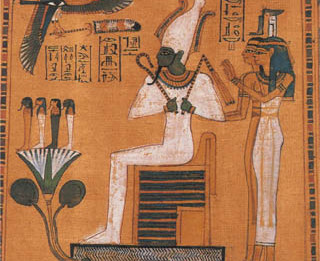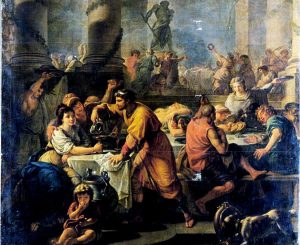Christmas, December 25th, is celebrated as the day Jesus was born. How did this come to be? Is this celebration a violation of God’s Commands?
Scholars have filled many books with arguments as to when Jesus was born. Nowhere in Scripture is any significance given to a person’s date of birth. It was not until the third century that the festival of Christmas was heard of. It did not gain observers until well into the fourth century. The first recorded “Christian” Christmas celebration on December 25th was in Rome in 336AD. However, by this time, most other religions in the empire were already celebrating the birth of their gods on December 25th. They had been doing so for centuries.
The Real Origins of Christmas

Christmas originated in Egypt in the days of King Osiris and Queen Isis and their son Horus, about 3,000 B.C. Yes, it stems from roots whose beginnings were long before the Flood, not to mention Jesus!
After the untimely death of King Osiris, his wife, Isis, propagated the doctrine of the survival of Osiris as a spirit being. She claimed a full-grown evergreen tree sprang overnight from a dead tree stump, which symbolized the springing forth unto new life of the dead Osiris. On each anniversary of his birth, she claimed, Osiris would visit the evergreen tree and leave gifts upon it. The Winter Solstice, December 25th was the birthday of King Osiris reborn as the son Horus.
This is also the true origin of the Christmas tree dating long before Jesus. This ancient origin explains why we find this in Jeremiah:
“Hear the word which the LORD speaks unto you, O house of Israel: Thus says the LORD, Learn not the way of the heathen, and be not dismayed at the signs of heaven; for the heathen are dismayed at them. For the customs of the people are vain: for one cuts a tree out of the forest, the work of the hands of the workman, with the axe. They deck it with silver and with gold; they fasten it with nails and with hammers, that it move not. They are upright as the palm tree, but speak not: …”
Jeremiah 10:1-5
December 25th the Winter Solstice
The Winter Solstice, which occurs on or around December 25th, is the day when the light begins to lengthen and regain power. This is the day that the pagan Great Mother gave birth to the Sun who is her son. The great Egyptian Mother Goddess, Isis, gave birth to Her son Horus, the Sun God. On the same day of the year, the Greek goddess Leta gave birth to the bright, shining Apollo. Demeter, the Great Mother Earth Goddess, bore Dionysus. The shortest day was also the birthday of the Invincible Sun in Rome, Dies Natalis Invictis Solis, as well as that of Mithra, the Persian god of light and guardian against dark evil. Practically every pagan deity was born or celebrated on December 25th.
Saturnalia

Saturnalia was a festival in ancient Rome leading up to December 25th. It was one of the biggest celebrations of the year. Saturnalia was a festival during which the Romans commemorated the dedication of the temple of their god Saturn. This holiday began on the 17th of December and last for an entire week until the 23rd of December. Gift-giving, feasting, singing and debauchery typically characterized Saturnalia. The priests of Saturn would carry wreaths of evergreen boughs in procession throughout the pagan Roman temples.
Later on, the Romans also started holding a festival on December 25th called Dies Natalis Solis Invicti. This festival name means ‘the birthday of the unconquered sun,’ as mentioned above. Basically, it was a way to consolidate all of the December 25th ‘sun god’ birthdays throughout the empire into one holiday. Pope Gregory I (590-604AD) obviously agreed with this practice. He pushed forward a doctrine of compromise with paganism in order to further Christianity. He re-purposed pagan temples, statues as well as feast days and “Holy” days to bring pagans into the Catholic fold.
Christmas is Pagan
Christmas is an ancient celebration of the birthdays of pagan gods which dates back long before the time of Jesus. God says in the first of the Ten Commandments, “You shall have no other gods before Me.” Christmas is pagan and a violation of the Commandments of God.
“Now therefore reverence the Lord and serve him in sincerity and in faithfulness. Put away the gods that your fathers served beyond the River and in Egypt, and serve the Lord. 15 … choose this day whom you will serve…”
Joshua 24:14
Christmas is about as pagan as any pagan convert to Christianity is. One of the marketing ploys of the early church was to take over the old pagan celebrations and rebadge them as Christian celebrations. The early church leaders knew that this was a good way to ease people into Christianity, and it worked well for them.
By all means criticise Christmas. There is plenty to criticise about modern Christmas customs. However, the fact that Christmas was based on old pagan celebrations from long ago does not automatically make them wicked.
Yes, the fact that Christmas was based on old pagan celebrations from long ago does make it wicked. Deuteronomy 4:2 Moses tells Israel that they shall not add to nor take away from the Words and Jeremiah 10:2 Says learn not the ways of the heathen. As with idolatry, Christmas is a distraction from the intent and purpose of God. The bottom line is this… ALL of scripture is a parable and if you start changing things, adding feast days, or praying to statues you will never be able to understand the parable.